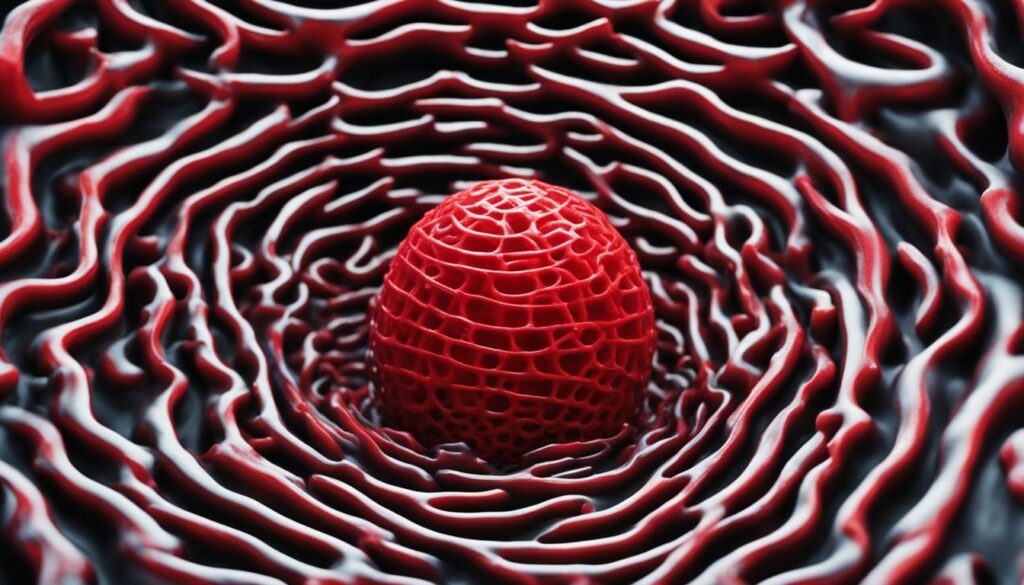Did you know that oxidative stress is a major contributor to male infertility, affecting sperm quality and function? Multiple sources have revealed that oxidative stress, caused by an imbalance between reactive oxygen species (ROS) and antioxidants, can lead to damage to sperm DNA and impair sperm function.
This surprising fact highlights the significant impact of oxidative stress on fertility and raises the question: can antioxidants improve sperm quality and boost fertility?
Key Takeaways
- Antioxidants counteract the harmful effects of oxidative stress on sperm quality.
- Studies have shown that antioxidants can improve sperm motility, concentration, and morphology.
- Antioxidant-rich foods and supplements can play a crucial role in enhancing male reproductive health.
- Lifestyle factors, such as avoiding exposure to toxins and maintaining a healthy lifestyle, are also important for sperm health.
- Further research is needed to determine the optimal use of antioxidants for improving sperm quality.
The Role of Oxidative Stress in Male Infertility
Oxidative stress is a significant factor in male infertility, affecting sperm quality and function. It results from an imbalance between reactive oxygen species (ROS) and antioxidants, leading to damage to sperm DNA and impairment of sperm function.
Oxidative stress and male infertility are closely linked due to the detrimental effects of ROS on sperm.
Reactive oxygen species, such as superoxide anion, hydrogen peroxide, and hydroxyl radical, can induce various mechanisms of male infertility. These mechanisms include DNA damage, lipid peroxidation, and protein oxidation.
The damaging effects of ROS can disrupt the structure and function of sperm cells, leading to reduced fertility (6, 7).
Multiple factors contribute to oxidative stress in the male reproductive system. Exposure to environmental toxins, such as pesticides, heavy metals, and radiation, can increase ROS levels and impact sperm quality.
Lifestyle choices, including smoking, alcohol consumption, and a poor diet, can also promote oxidative stress. Additionally, medical conditions such as diabetes, varicocele, and infections can exacerbate oxidative stress levels in the male reproductive system (11, 13).
Understanding the role of oxidative stress in male infertility is crucial for developing strategies to improve sperm quality and enhance male reproductive health.
By identifying and addressing the underlying factors that contribute to oxidative stress, it may be possible to mitigate its impact and improve the chances of conception in couples struggling with infertility.

Factors Contributing to Oxidative Stress in Male Infertility
| Contributing Factors | Impact on Oxidative Stress |
|---|---|
| Environmental Toxins | Increases ROS levels |
| Lifestyle Choices | Promotes oxidative stress |
| Medical Conditions | Exacerbates oxidative stress levels |
The table above highlights common factors contributing to oxidative stress in male infertility. Identifying and addressing these factors can play a crucial role in improving sperm quality and enhancing male reproductive health.
Antioxidants and Sperm Quality
Antioxidants play a crucial role in improving sperm quality by reducing oxidative stress and protecting sperm cells from damage. Consuming a diet rich in antioxidant-rich foods can provide the necessary nutrients to support healthy sperm production.
Additionally, supplementation with specific antioxidants has been shown to improve sperm motility, concentration, and morphology.
The Role of Antioxidant-Rich Foods
Eating a diet that is abundant in antioxidant-rich foods can significantly improve sperm quality. Fruits, vegetables, nuts, and whole grains are excellent sources of antioxidants that provide essential vitamins, minerals, and phytochemicals.
These nutrients help to neutralize reactive oxygen species (ROS), reduce oxidative stress, and enhance sperm health.
Include a table demonstrating various antioxidant-rich foods and their benefits for sperm quality. Consultation with a healthcare professional or nutritionist can help determine the most suitable dietary plan.
The Power of Supplementation
Supplementing with specific antioxidants can amplify the positive effects on sperm quality. The following antioxidants have been shown to improve sperm motility, concentration, and morphology:
- L-carnitine
- Coenzyme-Q10
- Omega-3 fatty acids
- Selenium
- Zinc
- Vitamin E
- Vitamin C
These antioxidants work by neutralizing free radicals, enhancing sperm DNA integrity, and optimizing sperm function. However, it is important to consult with a healthcare professional before starting any supplementation regimen to ensure the correct dosage and suitability for individual needs.
“Antioxidants help to neutralize ROS, enhance sperm DNA integrity, and optimize sperm function, ultimately improving overall sperm quality and fertility potential.”

By incorporating antioxidant-rich foods into the diet and considering targeted antioxidant supplementation under proper guidance, individuals can naturally improve sperm health and enhance their chances of conception.
Antioxidant Supplements for Sperm Quality
In addition to obtaining antioxidants from dietary sources, supplementation with antioxidant supplements can be beneficial for improving sperm quality.
Studies have shown that antioxidant supplements, such as L-carnitine, coenzyme-Q10, omega-3 fatty acids, selenium, zinc, vitamin E, and vitamin C, can effectively increase sperm motility, concentration, and morphology (15, 21, 22).
These supplements provide concentrated doses of antioxidants that may be more effective in combating oxidative stress and improving sperm quality. However, it is important to consult with a healthcare professional before starting any supplementation regimen, as individual needs may vary.
Antioxidant supplements offer a convenient way to boost antioxidant intake and enhance sperm health. These supplements are formulated with specific antioxidants known to support sperm production and protect against oxidative damage.
By providing concentrated doses of antioxidants, they help address any nutrient deficiencies and increase the overall antioxidant capacity in the body.
When considering antioxidant supplementation for sperm quality, it’s crucial to seek professional advice.
Healthcare professionals can assess individual needs, consider any underlying health conditions, and recommend the most suitable antioxidant supplements. They can also provide guidance on dosage, duration, and potential interactions with other medications.
Remember, while antioxidant supplements can be beneficial, they should not replace a healthy diet and lifestyle. A balanced diet rich in antioxidant-containing foods, combined with regular exercise and stress management, is key to optimizing sperm quality and reproductive health.
The Importance of Lifestyle Factors in Sperm Health
When it comes to sperm health, lifestyle factors play a crucial role alongside antioxidant supplementation. Making conscious choices to lead a healthy lifestyle can have a significant impact on sperm quality and overall reproductive health.
- Avoiding exposure to environmental toxins, such as cigarette smoke, alcohol, and certain chemicals, can help reduce oxidative stress and protect sperm cells from damage (4).
- Maintaining a healthy weight has been found to positively impact sperm quality. Studies have shown that men with a healthy body mass index (BMI) tend to have higher sperm counts and improved motility compared to those who are overweight or obese (5).
- Regular exercise has been associated with improved sperm quality. Engaging in moderate-intensity physical activity, such as brisk walking or jogging, can help enhance sperm count, motility, and morphology (5).
- Managing stress levels is also essential for optimal sperm health. Chronic stress can lead to hormonal imbalances and negatively affect sperm production and function. Practicing relaxation techniques like meditation and deep breathing can help reduce stress and improve reproductive health.
- Getting enough sleep is crucial for maintaining overall health, including reproductive health. Sleep deprivation has been linked to decreased sperm count, motility, and DNA integrity. Aim for 7-8 hours of quality sleep every night for optimal reproductive function.
“Leading a healthy lifestyle, including adopting good dietary habits, regular exercise, stress management, and adequate sleep, can significantly improve sperm quality and increase the chances of conception.”
By incorporating these lifestyle factors into your daily routine, you can contribute to your reproductive health and improve your chances of conception. Lifestyle choices can have a profound impact on sperm quality, and alongside antioxidant supplementation, they form a comprehensive approach to enhancing male fertility.
| Lifestyle Factors | Impact on Sperm Quality |
|---|---|
| Avoiding exposure to environmental toxins | Reduces oxidative stress and protects sperm cells from damage |
| Maintaining a healthy weight | Improves sperm count, motility, and morphology |
| Regular exercise | Enhances sperm count, motility, and morphology |
| Managing stress levels | Prevents hormonal imbalances and improves sperm production and function |
| Getting enough sleep | Maintains optimal reproductive health |
Conclusion
The impact of antioxidants on sperm quality and male reproductive health is significant. By reducing oxidative stress and protecting sperm cells from damage, antioxidants have been shown to improve sperm motility, concentration, and morphology.
Whether obtained through a balanced diet or supplementation, antioxidants play a vital role in enhancing sperm quality and increasing the chances of conception for couples struggling with infertility.
However, it is important to note that further research is needed to determine the optimal dosage, duration, and combination of antioxidants for maximum efficacy. Consulting with a healthcare professional is recommended to discuss individual needs and determine the most suitable approach to improving sperm quality.
In conclusion, antioxidants are a valuable tool in the quest for improved sperm quality. Their ability to counteract oxidative stress and promote healthy sperm function makes them an essential component of a holistic approach to male reproductive health.
As research continues to uncover more about the benefits of antioxidants, individuals and couples can take proactive steps to optimize their fertility potential.
FAQ
Can antioxidants improve sperm quality?
Yes, antioxidants have been shown to improve sperm quality by reducing oxidative stress and protecting sperm cells from damage. They can improve sperm motility, concentration, and morphology, ultimately increasing the chances of conception in couples struggling with infertility.
How do antioxidants affect sperm?
Antioxidants counteract the harmful effects of oxidative stress by neutralizing free radicals. They help reduce sperm DNA damage, lipid peroxidation, and protein oxidation caused by reactive oxygen species (ROS), enhancing sperm function and overall sperm quality.
What are the benefits of antioxidants for sperm quality?
Antioxidants can improve sperm motility, concentration, and morphology, all of which are essential factors for healthy sperm and fertility. By protecting sperm cells from damage, antioxidants can increase the chances of successful conception.
Can a diet rich in antioxidants improve sperm quality?
Yes, consuming a diet rich in antioxidant-containing foods, such as fruits, vegetables, nuts, and whole grains, can provide the necessary nutrients to support healthy sperm production and improve sperm quality.
Are there antioxidant supplements available for improving sperm quality?
Yes, antioxidant supplements, such as L-carnitine, coenzyme-Q10, omega-3 fatty acids, selenium, zinc, vitamin E, and vitamin C, have been shown to effectively improve sperm motility, concentration, and morphology. These supplements provide concentrated doses of antioxidants that may be more effective in combating oxidative stress and enhancing sperm quality.
How do lifestyle factors impact sperm health?
Lifestyle factors, such as avoiding exposure to environmental toxins, maintaining a healthy weight, exercising regularly, managing stress levels, and getting enough sleep, can positively impact sperm quality. Making conscious choices to lead a healthy lifestyle can contribute to overall reproductive health and improve chances of conception.




